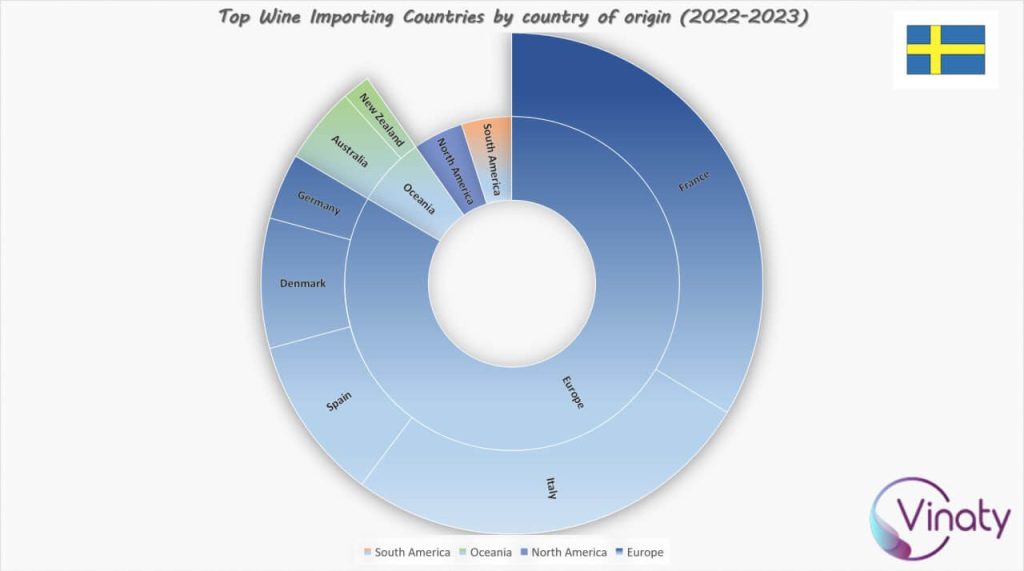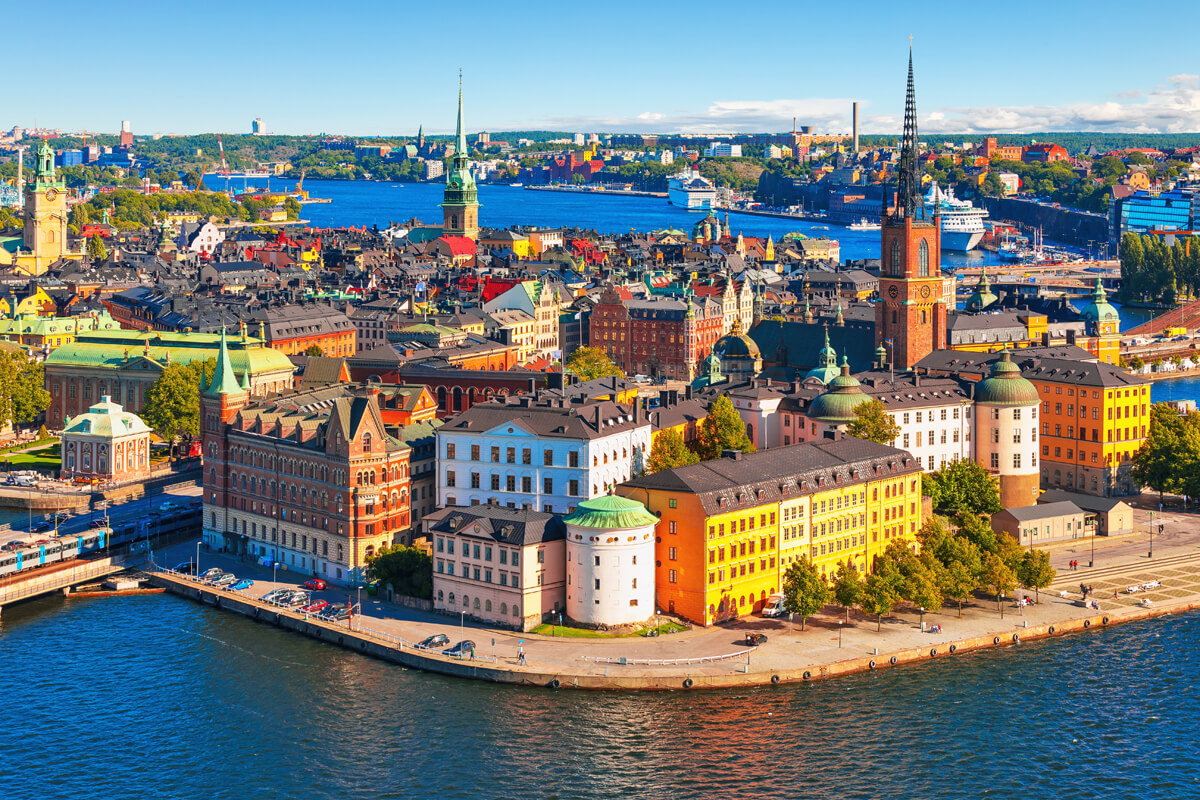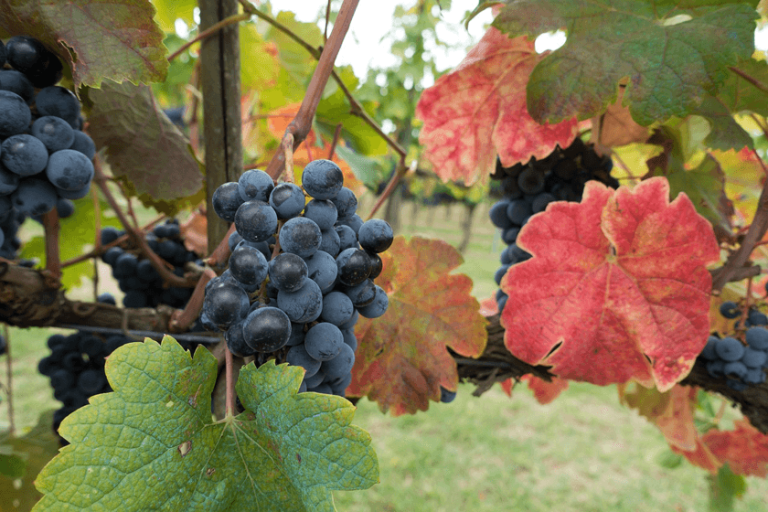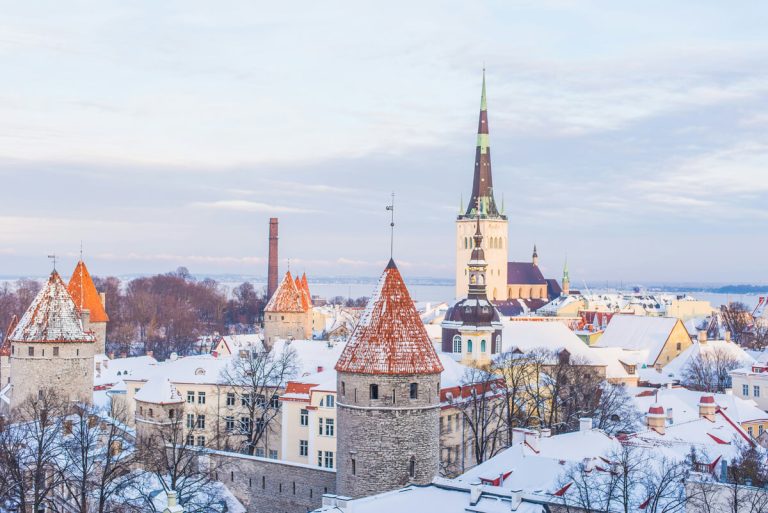Sweden, famous for its fjords, thousands of islands, expansive pine forests and ice-capped mountains, is a nation in the south of the Scandinavian peninsula. Its three major cities are all found on the coast, including the capital of Stockholm, Malmö and Gothenburg.
Sweden has the largest number of islands of any country in the world, with more than 220,000. However, they are mostly uninhabited. In the Stockholm Archipelago alone, there are about 24 thousand islands. Perhaps for this reason Stockholm is often called ‘the Venice of the North’, as the city is built on 14 islands connected by 57 bridges. To admire this natural beauty, you can take the city’s extensive network of ferries.
Governmental regulation of wine sales in Sweden
Governmental regulation of alcohol sales in Sweden is some of the toughest in Europe. Many bars sell alcohol to clients of age 18 and above, but other establishments may set limits of 21 or even 23. Things are quite different when it comes to the sale of alcohol in general stores and supermarkets. Drinks with a strength of more than 3.5% are simply not available there. Anything stronger is sold in stores known as Systembolaget, a state monopoly. There are about 450 Systembolaget in the country.
Systembolaget in the center of Stockholm sell Spanish, French and Italian wines, local dry gin, and beer from Sweden, Germany and Belgium. There is also glögg, a Swedish mulled wine, as well as wine from the USA, Latin America, and many, many more. At the checkout almost every customer will be asked to show their ID or passport. According to national law, only people aged 20 years or older can buy alcohol in Systembolagets.
Annual turnover of alcoholic beverage sales in Sweden
In 2021 the nationwide turnover at Systembolagets amounted to 30.9 billion SEK (3.3 billion USD), including alcohol tax of approximately 3 billion SEK
In 2022, sales at Systembolaget accounted for some 575 million liters, corresponding to a net sales value of 38 billion SEK. The share of organic wines is about 14% and it has increased in both volume and value, which in 2021 accounted for about 56 million liters, while organic beer made up almost 18 million liters.
How do Systembolagets work?
First of all, alcohol producers wanting to sell spirits need a permit to produce, store and ship spirits. The same rules apply to those who plan to sell their products to restaurants. In order to comply with the Systembolaget system, producers must also complete basic e-learning courses. After that, a contract may be signed between companies. Procurement rules are the same for all suppliers.
But what kind of drinks do Swedes prefer? This question is key to our understanding of the Swedish market. The harsh climate has undoubtedly affected the drinking culture, with Swedes consuming more spirits than Spanish, Italian or French people.
However, since the middle of the last century, Swedes began to switch from strong drinks to wine. The country even has its own Association of Winemakers called Svenska Vinodlare. The production of domestic wine officially began in 1999. The volume of wine production in Sweden, of course, is infinitely smaller than that of Italy, France, Spain, but, although confined to the country’s south, the industry is growing slowly. Svenska Vinodlare has no exact statistics, but figures are expected to be 2-3 hectoliters per year.
Wine imported into Sweden
According to public data from Statista Total, Swedish wine imports in 2022 amounted to $818.68 million. Most wine imported into Sweden comes from France, with Italy a close second. Unsurprisingly, Sweden exports 36 times less wine than it imports. According to the OEC, Sweden is the world’s 39th largest exporter of wine and its 13th largest importer.
Sweden imports wine primarily from:
France ($282M) – Wines from France are highly regarded in Sweden. Especially popular are wines from Bordeaux, Burgundy, Champagne, and the Rhône Valley.
Italy ($223M) – Swedish consumers have a strong affinity for Italian wines;
Spain ($89.2M) – Spanish wines from regions like Rioja, Ribera del Duero and Priorat are among Swedish favorites.
Denmark ($70.3M) – Danish beverages are well received by Swedish consumers.
Germany ($35.8M) – Swedish consumers appreciate German Rieslings in particular.
New World Wines, including the United States, Australia, Chile, Argentina, and South Africa, also have a presence in the Swedish market. Wines from other European countries, such as Austria, Hungary, Greece, and Portugal, are also imported and available in Sweden.

Main wine importers and distributors in Sweden
Given a relatively small population of just over 10 million, the Swedish wine market currently has at least 500 importers of alcoholic beverages. These include both small companies and large multinationals. There are several wine importers in Sweden that play a significant role:
1. Giertz Vinimport (Blasieholmsgatan 4A, 111 48 Stockholm, tel.: +46 8 21 83 88): Giertz Vinimport was established 1982 by Martin and Sara Giertz. The company is today the biggest importer of wine in Sweden and in 2018 sold over 21 million liters. The Swedish retail monopoly Systembolaget is its major customer and their products can also be found at restaurants all over Sweden. Giertz Vinimport imports and distributes wines from countries including Italy, France, Argentina, Chile, Portugal, Spain, South Africa, Germany, Bulgaria, Australia, New Zealand, and the United States.
2. Philipson Söderberg (Regeringsgatan 109, 103 92 Stockholm, tel.: +46 8 92 19 11): Philipson Söderberg is a well-established wine importer in Sweden, known for its extensive range of wines. They import wines from both Old World and New World regions (Italy, Chile, New Zealand, Portugal, Argentina, Austria, South Africa, Germany, France, Spain, and the United States), offering a wide selection to Swedish consumers.
3. Enjoy Wine & Spirits AB (Alsnögatan 11, 116 41 Stockholm, tel.: +46 8 556 947 00): Enjoy Wine & Spirits is a wine importer with a focus on artisanal and boutique wines. They emphasize sustainable production and offer a curated selection of wines from different parts of the world, including Italy, France, Austria, Spain, Portugal, Germany, and the United States.
4. Handpicked Wines AB (Bondegatan 21, 116 33 Stockholm, tel.: +46 8 510 691 00): Handpicked Wines specializes in importing wines carefully selected by their team of experts. They focus on small, family-owned wineries from Argentina, Australia, Chile, France, Hungary, Greece, Italy, New Zealand, Portugal, Spain, South Africa, Germany, Austria, and the United States. Their company aim is to bring unique, high-quality wines to the Swedish market.
5. Wineworld Sweden AB (Regeringsgatan 109, 111 39 Stockholm, tel.: +46 8 662 18 00): Wineworld Sweden is a wine importer and distributor that specializes in offering a wide selection of organic and biodynamic wines from Argentina, Chile, Australia, France, Italy, New Zealand, Portugal, South Africa, Spain, and Uruguay.
A more complete list of wine importing companies can be found in the Vinaty database.
Key figures for the Swedish wine market
Total revenue on the wine market amounted to US$1.8bn in 2023, with annual growth predicted at 5.14% (CAGR 2023-2028).
- Sweden is the 39th largest exporter of wine in the world & 13th largest importer of wine.
- Wine consumption by Swedes can be broken down into 72.3% still wine, 22.9% sparkling wine, and 4.8% fortified.
- Organic wine has increased in both volume and value. In 2021, organic wine accounted for about 56 million liters and organic beer almost 18 million liters.
- According to data from the Swedish National Institute of Public Health (Folkhälsomyndigheten), the per capita consumption of pure alcohol among individuals aged 15 years and older was 8.8 liters in 2019.
Summary about Sweden wine market
Scandinavia is not known internationally as a wine region, but due to climate change and grape varieties adapted to the local weather, Swedish winemakers have been able to develop their own production. Today there are about 40 producers in the country. At only two or three hectares, the area of commercial vineyards in Sweden is tiny compared to the wine regions of Europe. Given that wine consumption in the country is on the rise, and the wine market is expected to show growth of 3.6% in 2024, Sweden is open to foreign wines and high-value imports.
References used to prepare this article:
- Statista
- https://oec.world





